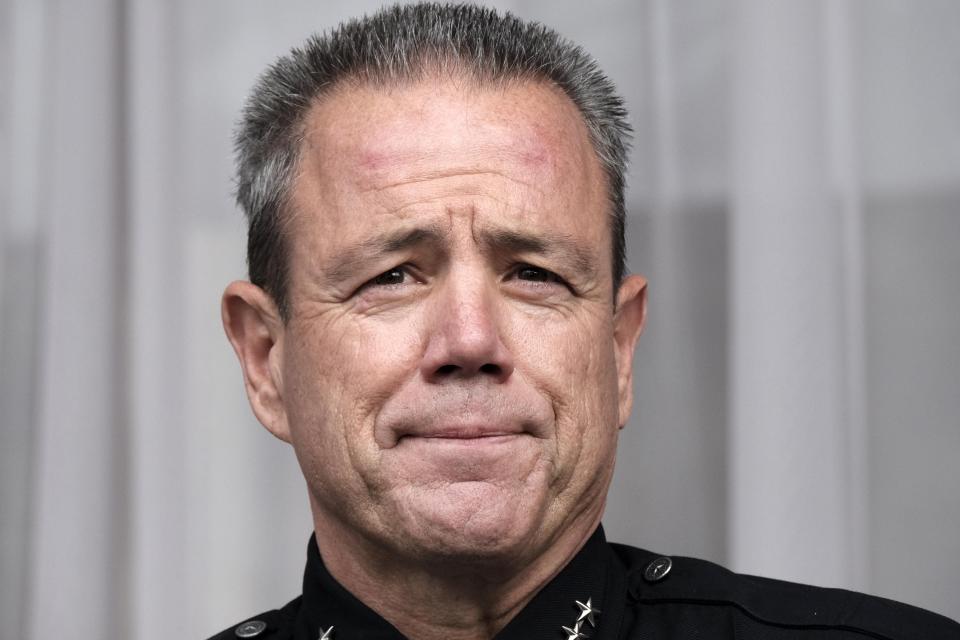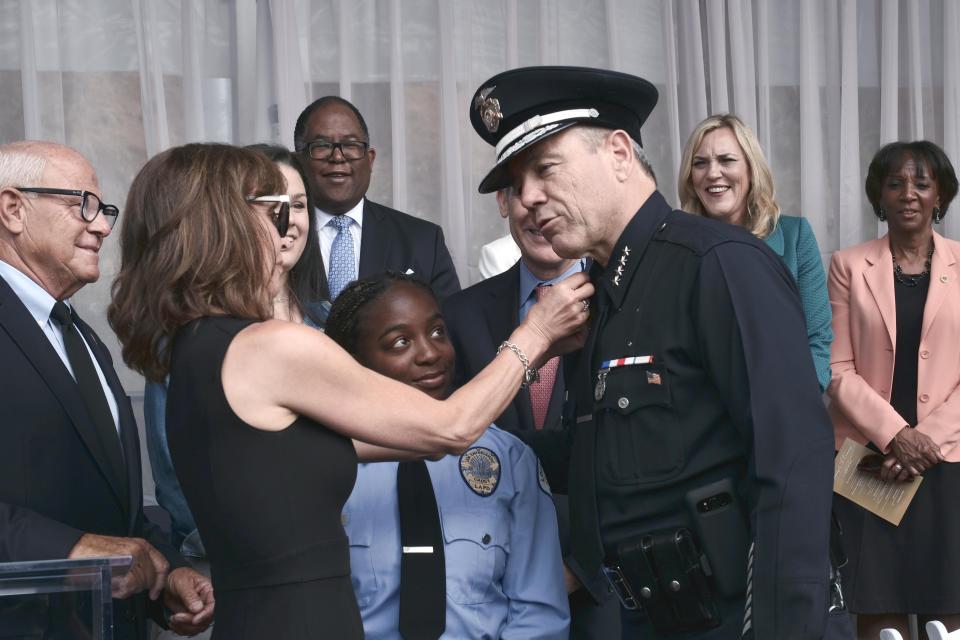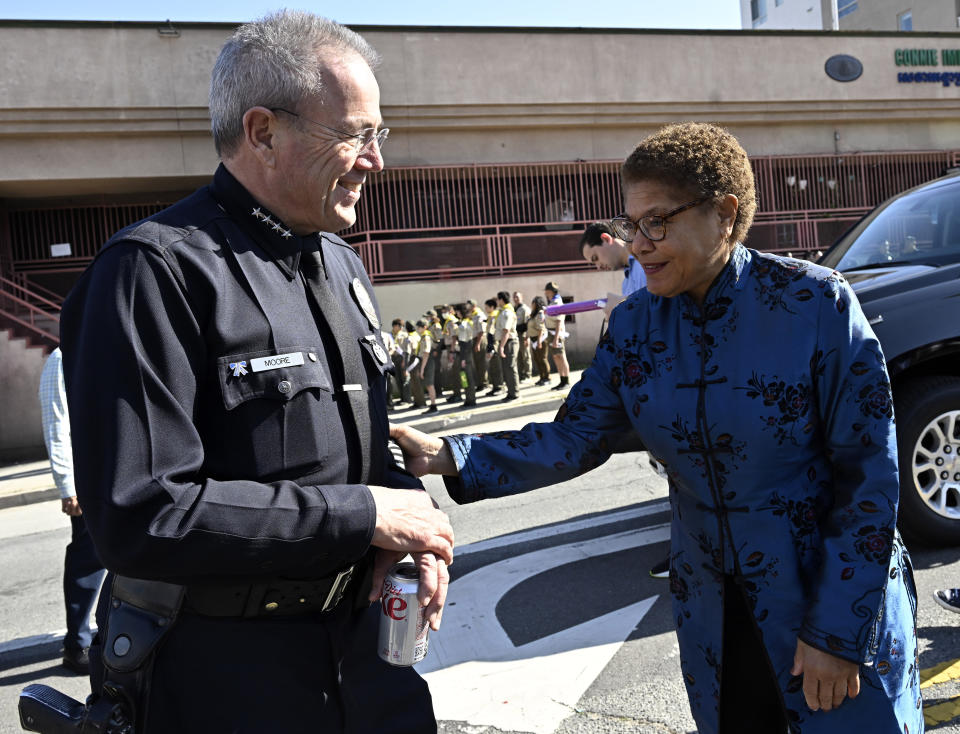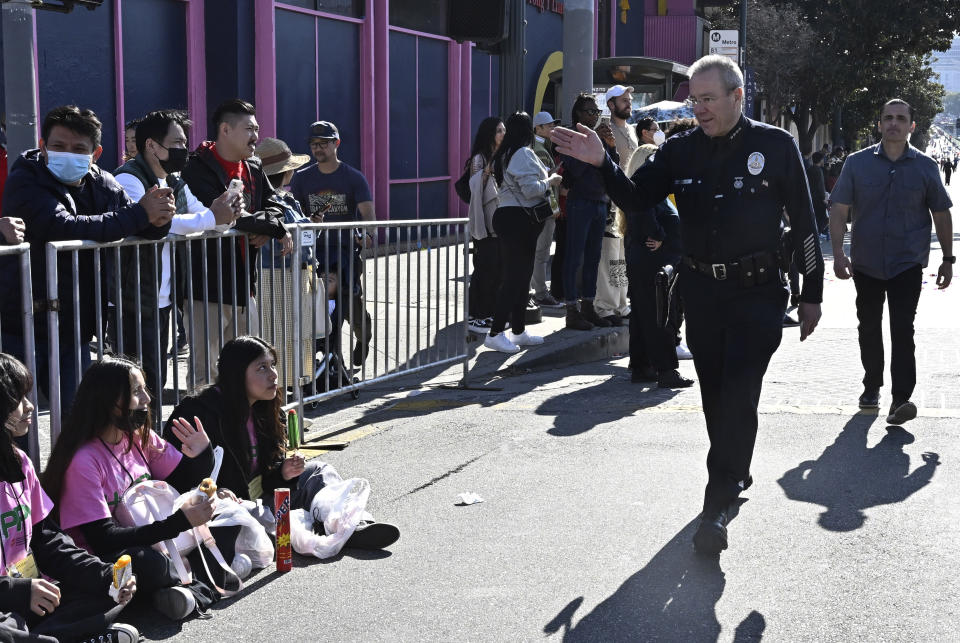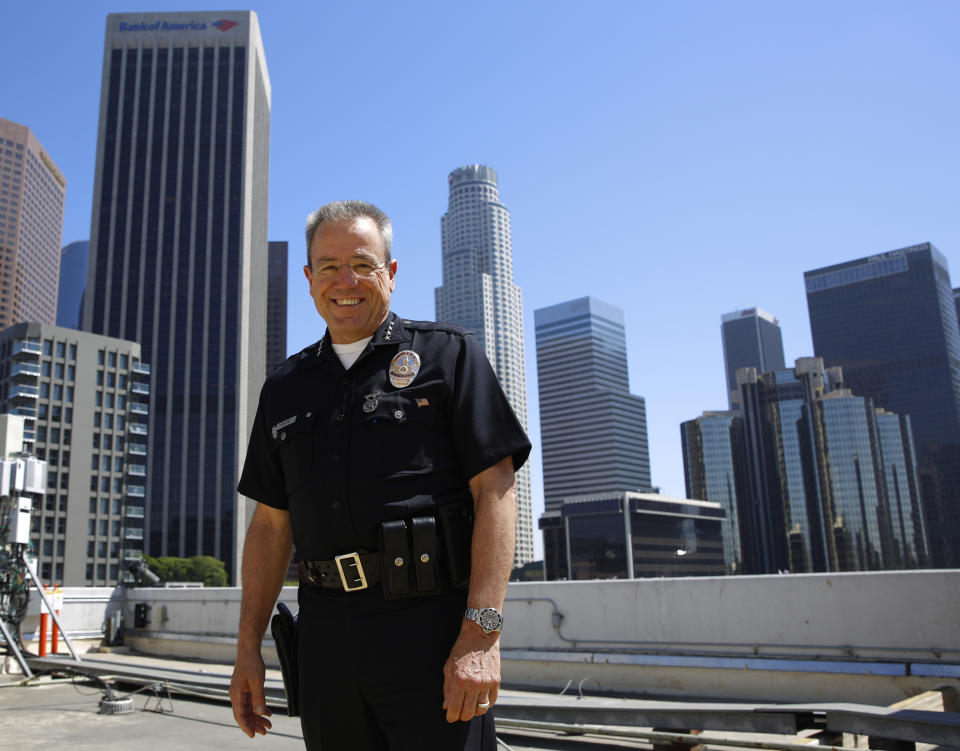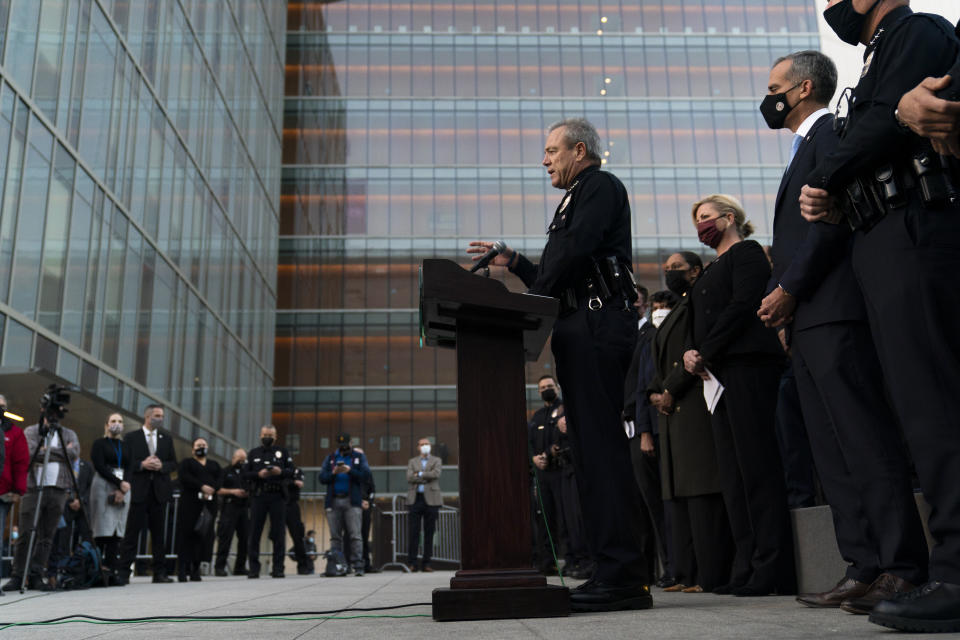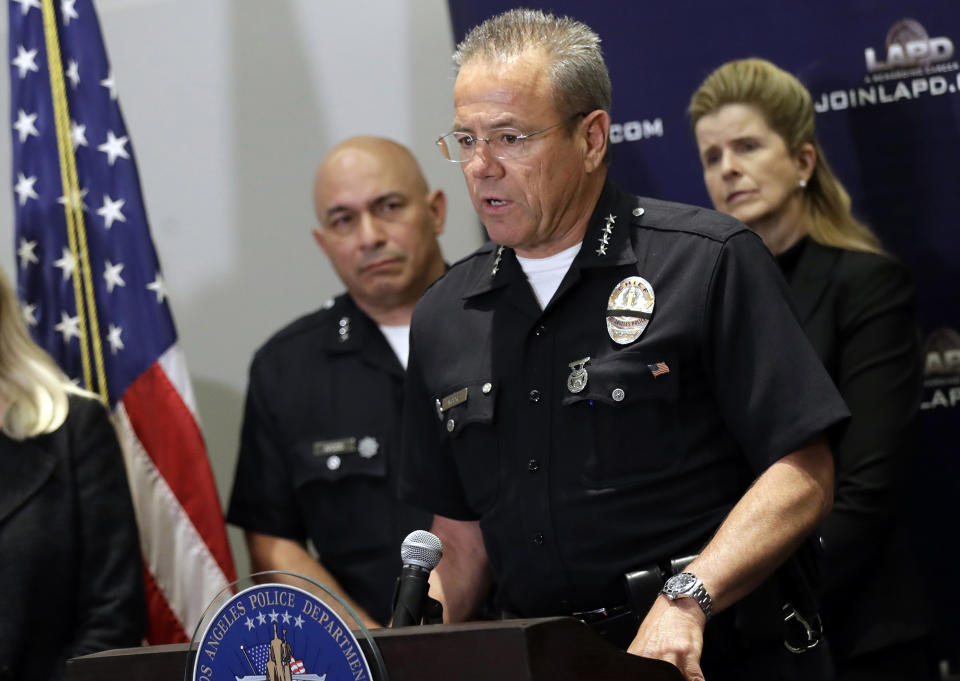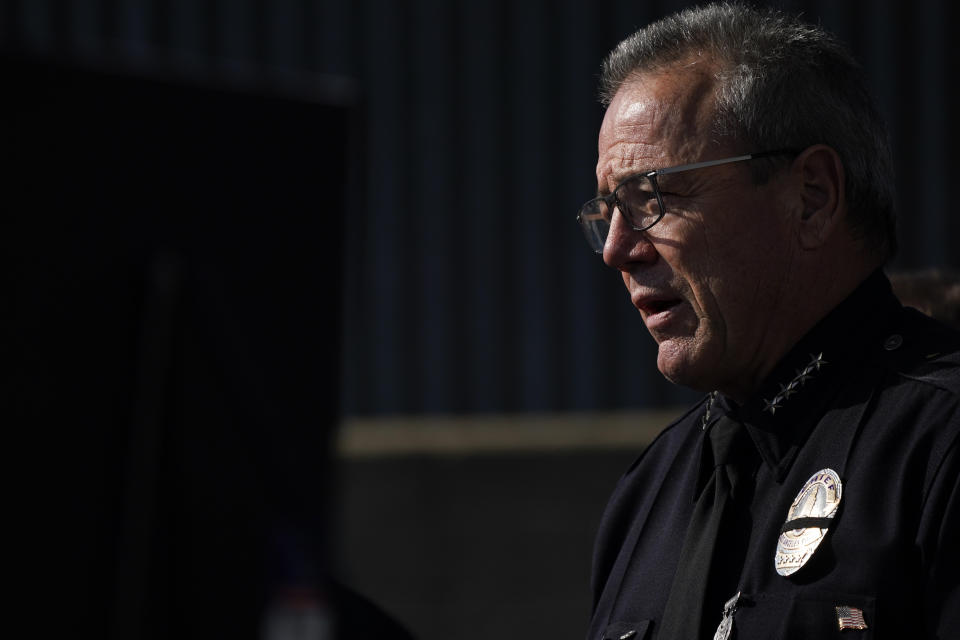Los Angeles police chief announces retirement after tumultuous tenure marked by pandemic, protests
- Oops!Something went wrong.Please try again later.
- Oops!Something went wrong.Please try again later.
- Oops!Something went wrong.Please try again later.
LOS ANGELES (AP) — The Los Angeles police chief announced his retirement from the head of one of the nation's largest law enforcement agencies Friday, concluding a tenure marked by the COVID-19 pandemic, protests over racial injustice and greater scrutiny into excessive force and police killings of civilians.
Chief Michel Moore is stepping down in February but will remain on as a consultant for an undetermined amount of time. He leaves as the department, like many nationwide, reconsiders its use of force in the wake of George Floyd’s murder and subsequent protests in 2020. Moore’s department faced staunch criticism for its handling of demonstrations.
“During my tenure, I know I’ve made mistakes and missteps,” Moore said during a news conference with Mayor Karen Bass. “But I’m also confident that my work has seen success across a broad spectrum of topics, unmatched by any other law enforcement agency in this country.”
The Board of Police Commissioners will appoint an interim chief ahead of a nationwide search. The next leader will be charged with overseeing security during the 2028 Olympics.
Moore became the city's top police officer in 2018. Although he was reappointed last year for a second five-year term as chief and repeatedly said he did not plan to serve the full five years, the news of his retirement was unexpected.
Choking up, Moore said he and his wife plan to move closer to their out-of-state daughter. He called it a “distinct honor and privilege" to serve Los Angeles over a four-decade career.
In the aftermath of the George Floyd protests in LA, an independent report excoriated the department for its actions, citing antiquated tactics and neglected reforms that had been agreed upon after the mishandling of previous demonstrations over the last two decades.
While most of the protests across the city were largely peaceful, pockets of violence and crime erupted. Hundreds were injured or accused police of violating their rights during clashes and mass arrests, prompting several lawsuits. Scores of businesses were damaged or looted, and more than 100 officers were injured.
Local activists have continued to protest the department and Moore's leadership.
“Fired by the people! #NoMoreMoore,” the Los Angeles chapter of Black Lives Matter said on X, formerly Twitter, on Friday.
Known as a cerebral and data-driven chief, Moore has come under fire for his officers' mistakes and misconduct. Police fatally shot Mely Corado, an innocent bystander, during a standoff at a Trader Joe's in 2018.
On X, her brother Albert Corado criticized Moore's decision to prioritize his wife and daughter when "so many families of people that have been killed by the LAPD don’t get to spend time with their loved one."
Moore’s tenure also overlapped with a long-running debate over Proposition 47, which was passed by California voters in 2014 and reclassified felony theft offenses as misdemeanors. Critics have blamed the change for fueling a rash of smash-and-grab robberies, but supporters say it does not allow shoplifting and petty theft to go unprosecuted. Bass credited Moore with forming a task force to address smash-and-grab thefts, adding that they had declined since the formation of the group.
Public frustrations have also mounted over the city's unabated homelessness crisis, with roughly 46,000 people living on the streets. Law enforcement's role in responding to homelessness has changed across much of California as the state focuses more on services and less on criminal citations, but police still play some role in encampment cleanups and are called to respond to crimes in and around them. Homeless people in Los Angeles were the victims of nearly a quarter of the city's homicides in 2021.
Other stains on Moore's legacy include when bomb technicians in South Los Angeles in 2021 overloaded a containment chamber with homemade fireworks during a detonation and caused a catastrophic explosion that injured more than a dozen people and rocked a neighborhood.
Last year, a public records release accidentally included the names and photographs of hundreds of undercover officers, which were posted online by a technology watchdog group. The officers were not given advance notice of the disclosure, and the backlash roiled the department. The inspector general launched an investigation into Moore and the agency’s constitutional policing director after an officers union filed a misconduct complaint.
More recently, stories about scandals involving his command staff played out in the Los Angeles Times, while officers on the street are facing depleted ranks. There are fewer than 9,000 deployed officers in the nation's second-largest city, far less than its allotment of 9,500.
The Los Angeles Police Protective League, the union that represents rank-and-file officers, praised Moore’s “open-door policy that allowed the LAPPL to deliver the perspective of the rank and file on various issues.”
“Although we did not always agree, we had a respectful and productive relationship,” the league’s board of directors said in a statement. They urged the selection of a new chief who is “committed to rebuilding the ranks of the department, reducing violent crime, and improving morale.”
